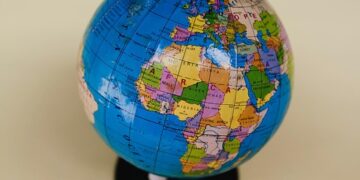Communist Party is desperate to cover it up. They’re doing some pretty tricky things to do just that. Now hang on a moment, I’ll get to that in a minute, but first some background. Chinese stocks have lost $6 trillion in the last three years. If you break that down,
That’s about 5 and a half billion dollars *per day*. Yes, I said billion with a “B”. Two of China’s biggest industries—manufacturing and real estate—are facing some of their biggest headwinds in years, and it’s gotten so bad that even by official data, it doesn’t look good.
Real estate used to be the go-to for Chinese investors because China’s stock market is notoriously volatile. Case in point: Chinese stocks losing $6 trillion in 3 years. But after the government tried to reign in a bubble in the housing market a few years ago,
Two-thirds of Chinese property developers have now gone into default. Evergrande, arguably China’s largest property developer, was ordered to dissolve last month after it failed to come up with a restructuring plan that was acceptable to investors. All this has, not surprisingly, spooked Chinese investors from putting their money into the
Real estate market, which has, in turn, put property developers in even more of a bind. According to the China Index Academy, “Total sales of 100 surveyed real estate enterprises dropped 33.3% year-on-year by value in January, outstripping the decline a year earlier by 1.6 percentage points.”
And this isn’t *just* affecting property developers and investors. China’s real estate market makes up at least a third of China’s GDP, which means a lot of other industries that support the real estate industry are affected, as well. Local governments are hugely dependent on the housing market. That’s because a big source of
Their revenue comes from land sales. And if no one’s buying and developing land, that means local governments lose out on those land sale fees. On top of that, local governments were the ones mainly paying for China’s disastrous zero-covid policy, Which is why local government debt is now at a record high.
And speaking of zero covid, China’s economy still hasn’t recovered from it. There were a lot of predictions about how China’s economy would rebound and boost global growth after zero covid ended. But that never really happened. I mean, there was a small rebound after, you know,
When people were allowed to leave their homes and actually buy food and such. But in terms of a sustained recovery that’s able to boost global growth, not so much. Meanwhile, China’s manufacturing shrank for a fourth straight month in January. China would normally rely on foreign investors to patch things over during
These hard times, but the government has managed to scare them off, too. First it was the raids on due-diligence firms, which investors rely on to give them accurate information in a very opaque country. Then there were headlines about how the government was exit banning business executives and employees in record numbers.
Then an anti-espionage law went into effect that made everyday business transactions potentially illegal. So surprise, surprise—to no one—foreign direct investment tanked last year. And it doesn’t seem likely to recover anytime soon thanks to China now being widely perceived as a hostile business environment.
The EU Chamber of Commerce in China said in its position paper last year that “contradictory messaging from authorities over the past year has European businesses wondering what kind of relationship China wants to have with them.” Meanwhile, The American Chamber of Commerce in China said its “members expressed concern
About…expectations regarding China’s openness and business climate”. And “Australian companies share many of the concerns of their US counterparts.” Now when you hear companies with a lot invested in China saying they’re concerned about the business environment, you know China’s got problems.
And yet to read Chinese state-run media, you would think US companies are just flocking to China! But according to the American Chamber of Commerce, “Almost one-fifth of US businesses in China are looking to move some of their operations out of the country” and “Forty per cent…said they were redirecting or planning to redirect
Investment originally planned for China to South-East Asia or other parts of the world.” So clearly Chinese state-run media is trying to convince the world that the canary in the coal mine is still chirping, but that’s not the only way the CCP is trying to hide China’s rotten economy.
After the break, I’ll tell you about the more insidious ways the government is trying to conceal data on China’s economy. Welcome back. So if you read Chinese state-run media, you would come away with a pretty rosy picture of China’s economy.
According to China Daily, “Experts are expressing confidence in China’s growth outlook.” Never mind that those so-called experts are only allowed to be quoted in state media because they’re towing the Party’s line, which is currently that China is facing headwinds, but that things are looking up.
The Global Times states that Chinese ports got off to a strong start in January—which, compared to last January when China was just coming out of lockdown, is actually not saying much. They’re using the same baseline to claim that “US fast food giants” are doing better in 2023 than
In 2022 as a “rebuttal to Western media reports on China.” It’s equally as intellectually dishonest. In case you don’t remember, people couldn’t even *eat in restaurants* in 2022 because of zero covid. So again, saying growth since the pandemic shows progress isn’t exactly the coup they think it is.
Now if you’re a savvy news consumer, Chinese state-media probably won’t fool you. They’re clearly cherry-picking data that fits their narrative. And if you read western media or even do just a little critical thinking, it’s easy to see right through it. But there are a lot more insidious ways that the CCP is manipulating
Information about its economy to trick investors. After the Party’s Central Economic Work Conference last year, it released a communique that said the CCP must “step up economic propaganda and public opinion guidance, spreading the idea that there is a bright future for the Chinese economy.” Yes, a bright future for the Chinese economy.
Just like the gold sales last year that were such a bright spot in China’s rebound from Covid. Because you know, gold bars totally weren’t one of the ways Chinese citizens were smuggling their money out of China. But anyway, one of the ways that the CCP seems to
Be doing “economic propaganda and public opinion guidance”… …is by making business analysts disappear from social media. “Some of China’s most prominent analysts have been subjected to social media restrictions that appear designed to restrict their ability to comment on the country’s ailing stock markets and struggling economy.”
According to CNN, they were all independent analysts who “were known to air candid views” on China’s economy. Yes, nothing says China’s economy is doing great more than…disappearing anyone who doesn’t say China’s economy is doing great. Similarly, Chinese economists told the Financial Times they were told not to be negative about China’s economy.
“Multiple local brokerage analysts and researchers at leading universities as well as state-run think-tanks said they had been instructed by regulators, their employers and even domestic media outlets to avoid speaking negatively about topics ranging from fears of capital flight to softening prices.” Even news articles about people struggling financially or the poor
Living standards of migrant workers are being scrubbed from Chinese social media. But that’s not all. Earlier this month, China fined S&P Global’s Chinese subsidiary and five other credit ratings agencies for business violations. Taiwanese economist Huang Shicong told The Epoch Times that “’The
Central bank [is punishing] credit rating agencies in an attempt to stop them from publishing analytical reports that are unfavorable to China’s economy.’” While that’s hard to prove, it wouldn’t be a surprise. In December, credit rating agency Moody’s changed its outlook for China from stable to negative.
That week, Moody’s told its staff to work from home because it feared authorities might retaliate. If you think about it, that’s actually a brilliant PR move. When they advertise for jobs they can claim they “optimize work-life balance” by letting employees work from home…you know, when they’re
Possibly going to be arrested if they go into the office. Sounds like a great place to work. The CCP has also tinkered with the data to, well, at least make China’s economy not look as bad as it really is.
We know, thanks to China’s former Premier Li Keqiang and a US cable obtained by Wikileaks, thatChina’s GDP is totally man-made and unreliable. Gosh, I wonder if that’s how China’s GDP was able to do even *better* –just barely– than the government predicted last year!?
China’s National Bureau of Labor Statistics said China’s economy grew by 5.2% last year. Meanwhile, the Rhodium Group ,a think tank that specializes in China data, estimated “that actual growth in 2023 was more like 1.5%.” So who’s right? Well it’s hard to say for sure,
But given all the headwinds China’s economy is facing right now and knowing how the government likes to manipulate the data, I would put my money on Rhodium. Here’s another one: according to official numbers, China’s yearly exports dropped 4.6% last year, the first time in 7 years exports have gone down like that.
However, as bad as that may sound, it’s likely worse. According to Business Insider, “Chinese Custom Bureau’s official data has begun to diverge noticeably from import data from the country’s trading partners.” For example, “import data reported by countries, such as Vietnam, Singapore, Malaysia and Thailand,
Has been showing widening discrepancies when compared with Chinese export data.” Now there could be some technical explanations for that, such as Chinese goods that didn’t end up at their intended destination. But given how China’s economy runs on fraud, I’m going to guess there was at least *some* gerrymandering going on behind the scenes.
It’s not just the central government data that’s being corrupted, though. Chinese local governments were caught last year using fake property deals to boost revenues. Gee, I wonder if that’s why China’s bursting housing bubble is doing more damage than official data suggests?
Official data show China’s home prices dropped 2.4% last year from a high in August 2021, while prices for existing homes went down 6%. But when Bloomberg talked to property agents and private data brokers, it found that prices were actually down at least 15% in a lot of places.
In some places like Hangzhou, prices were down 25% compared to the highs of 2021. While this kind of data manipulation isn’t new, it’s arguably more problematic than ever. The government probably thinks it’s boosting investor confidence by making the economy look healthier than it is. But what really kills
Investor confidence is not having an accurate picture of the economy. And since everything I just told you is public knowledge, China’s plan is inevitably going to backfire. And you know what else has backfired? YouTube’s attempts to censor us. Thanks to all the fans who I call our 50 cent army,
China Uncensored is able to keep the lights on and the show going. You too can be a member of the 50-cent army by going to Patreon.com/Chinauncensored. You can pledge as little as a dollar per episode, and you can even set a monthly limit. Hit that orange button or go to Patreon.com/Chinauncensored.
Once again I’m Chris Chappell, thanks for watching the show.

































 Reaction & Commentary
Reaction & Commentary














